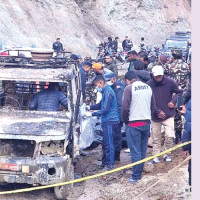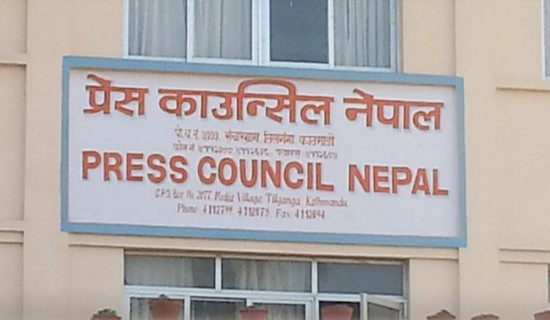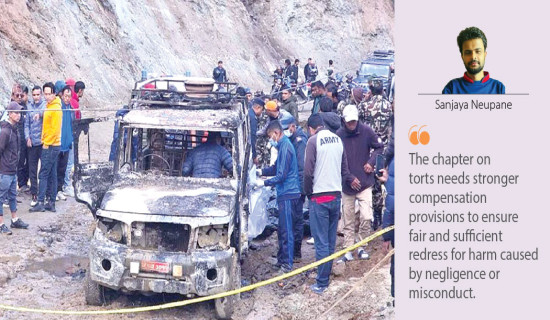- Friday, 2 May 2025
A Treatise Of An Indian Civil Servant
A civil servant's treatise is very important in the sense that it deals with things that actually happened in his career. It also elucidates various facets of decision-making, like what did not happen, what transpired in between, or what was prevented from happening as a result of various reasons, including official and political machinations.
This becomes even more significant when a civil servant who chooses to seek early retirement following his differences with the government or his political boss prefers to write his memoirs with inside details of what led him ultimately to choose the course that is never an aspired thing for a bureaucrat, that too in such a vital position.
Subhash Chandra Garg is a top Indian civil servant and finance secretary who thought it opportune to resign from the plum position before reaching superannuation. A 1983 batch Rajasthan cadre officer of the Indian Administrative Service, he decided to quit the post following his differences with his finance minister, Nirmala Sitharaman, despite having pulled well with two of her predecessors, late Arun Jetley and Piyush Goel, taken as one of the potential leaders of the Bharatiya Janata Party.
However, the prolific writer calls the first lady Finance Minister of India (incidentally also the first female Defence Minister of the country too, as she assumed the post earlier) the 'principal reason' for writing the book. While Sitharaman seems not to have expressly reacted to his decision to call it a day from the civil service rather prematurely, he found her body language as something reading as a "good riddance."
At the same time, the book portrays internal contradictions that a senior bureaucrat has to confront, as that applied in the case of Garg. He seems to have very good relations with the Narendra Modi government, which posted him at the World Bank as Executive Director and later as Secretary, Department of Economic Affairs (DEA), making him the first Executive Director of the global body to assume such an important position in his country.
The DEA is an organisation of the government of India that has both external engagements and domestic involvements. The writer gives importance to the overriding role of the Prime Minister's Office in both the formulations and executions of government policies and regulations, besides various other statutes that have a direct bearing on the economy of the country at large.
The author is honest enough to give full credit to the Modi-led government for both positions, stating that he did not have any chance to assume these plum posts if the National Democratic Alliance government headed by the first BJP leader to command a majority of its own had not come to power in 2014.
The title of the book is quite self-revealing: WE ALSO MAKE POLICY: AN INSIDER'S ACCOUNT OF HOW THE FINANCE MINISTRY FUNCTIONS. A must-read book to understand the intricacies of a top ministry of the government of India, it also divulges various aspects of bureaucracy.
The author, who spent thirty-six eventful years in the administrative service with deep experience of finance, both domestically as secretary in the government of Rajasthan and later at the central level, and externally as executive director of the World Bank, has been generous in dedicating the book to ministers, officers, and staff of the organisation he worked for during the momentously turbulent period of 2017-19.
However, he has thought it proper to specifically name Arun Jetley, a noted legal and financial stalwart, as he deems to call him, who was his boss during most of his rather incomplete tenure in the DEA, apart from, of course, giving special thanks to his best half, Anjali Garg.
Among others who have got acclaim from the prolific writer in the book are, apart from two political stalwarts, Narendra Modi and Arun Jetley, Dr. E.A.S. Sharma, former Finance Secretary, Dr. P.K. Mishra and Nripendra Mishra, both Principal Secretaries to the Prime Minister, and other senior officials like Hasmukh Adhia and Arvind Subramanian.
He specifically credits Nripendra Mishra, who was later asked by Modi to supervise his plan to metamorphose the Nehru Memorial at Teen Murti Marg into the Prime Ministers' Memorial. Mishra was later deputed to look after the flagship project relating to Ayodhya temple construction that caught international headlines when the image of Lord Ram was installed on January 22, 2024, in what was called the Praan Pratisthaa ceremony.
Divided neatly into five sections, the book tends to devote more to policy decisions that ignited controversies like electoral bonds, demonetisation, investment, and the contentious minimum support price for farmers, and seemingly complex institutional issues that constitute sections II and III, respectively, forming the chunk of the account occupying almost two-thirds of the space.
Three other chapters in the book deal with the author's induction as Secretary of Economic Affairs, the government of India's budgets, and the concluding saga of voluntary retirement. The book portrays complex and complicated but vital relations that bind the Reserve Bank of India and its governors with the government of India and principally the finance ministry, finance ministers, and finance secretaries. The prologue of the work is quite comprehensive and succinctly sums up the whole content.
As it generally applies to all civil servants, save some activist-type anomalous activities seen here and there that can be taken as an exception, Garg has been conscious to say that his book is a mix of his own perceptions, published official statements, and newspaper reports and specifically avoids use of any secret or confidential government account.
In a nutshell, the book is a wonderful addition to the literature on memoirs of civil servants of India, as there are a plethora of writers contributing to this aspect for all these years. In the case of Garg, he is pragmatic, frank, and even modest in admitting that a confluence of circumstances rather than merit and experience in the job landed him as Secretary, DEA.
I congratulate the prolific author on his wonderful publication. It is high time that our top bureaucrats too took the cue from Garg and published their accounts based on the real situation that prevailed in their periods rather than simply striking monologues of one's own doings.
(Dr. Bhattarai is a former foreign secretary, ambassador, and author; kutniti@gmail.com)
















